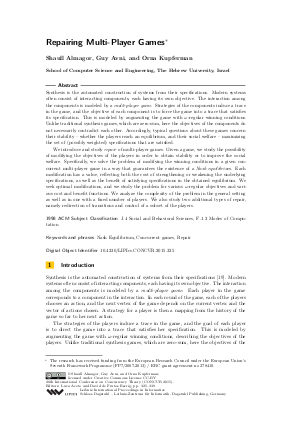Repairing Multi-Player Games
Authors Shaull Almagor, Guy Avni, Orna Kupferman
-
Part of:
Volume:
26th International Conference on Concurrency Theory (CONCUR 2015)
Part of: Series: Leibniz International Proceedings in Informatics (LIPIcs)
Part of: Conference: International Conference on Concurrency Theory (CONCUR) - License:
 Creative Commons Attribution 3.0 Unported license
Creative Commons Attribution 3.0 Unported license
- Publication Date: 2015-08-26
File

PDF
LIPIcs.CONCUR.2015.325.pdf
- Filesize: 478 kB
- 15 pages
Document Identifiers
Subject Classification
Keywords
- Nash equilibrium
- concurrent games
- repair
Metrics
- Access Statistics
-
Total Accesses (updated on a weekly basis)
0PDF Downloads0Metadata Views
Abstract
Synthesis is the automated construction of systems from their specifications. Modern systems often consist of interacting components, each having its own objective. The interaction among the components is modeled by a multi-player game. Strategies of the components induce a trace in the game, and the objective of each component is to force the game into a trace that satisfies its specification. This is modeled by augmenting the game with omega-regular winning conditions. Unlike traditional synthesis games, which are zero-sum, here the objectives of the components do not necessarily contradict each other. Accordingly, typical questions about these games concern their stability - whether the players reach an equilibrium, and their social welfare - maximizing the set of (possibly weighted) specifications that are satisfied. We introduce and study repair of multi-player games. Given a game, we study the possibility of modifying the objectives of the players in order to obtain stability or to improve the social welfare. Specifically, we solve the problem of modifying the winning conditions in a given concurrent multi-player game in a way that guarantees the existence of a Nash equilibrium. Each modification has a value, reflecting both the cost of strengthening or weakening the underlying specifications, as well as the benefit of satisfying specifications in the obtained equilibrium. We seek optimal modifications, and we study the problem for various omega-regular objectives and various cost and benefit functions. We analyze the complexity of the problem in the general setting as well as in one with a fixed number of players. We also study two additional types of repair, namely redirection of transitions and control of a subset of the players.
Cite As Get BibTex
Shaull Almagor, Guy Avni, and Orna Kupferman. Repairing Multi-Player Games. In 26th International Conference on Concurrency Theory (CONCUR 2015). Leibniz International Proceedings in Informatics (LIPIcs), Volume 42, pp. 325-339, Schloss Dagstuhl – Leibniz-Zentrum für Informatik (2015)
https://doi.org/10.4230/LIPIcs.CONCUR.2015.325
BibTex
@InProceedings{almagor_et_al:LIPIcs.CONCUR.2015.325,
author = {Almagor, Shaull and Avni, Guy and Kupferman, Orna},
title = {{Repairing Multi-Player Games}},
booktitle = {26th International Conference on Concurrency Theory (CONCUR 2015)},
pages = {325--339},
series = {Leibniz International Proceedings in Informatics (LIPIcs)},
ISBN = {978-3-939897-91-0},
ISSN = {1868-8969},
year = {2015},
volume = {42},
editor = {Aceto, Luca and de Frutos Escrig, David},
publisher = {Schloss Dagstuhl -- Leibniz-Zentrum f{\"u}r Informatik},
address = {Dagstuhl, Germany},
URL = {https://drops.dagstuhl.de/entities/document/10.4230/LIPIcs.CONCUR.2015.325},
URN = {urn:nbn:de:0030-drops-53741},
doi = {10.4230/LIPIcs.CONCUR.2015.325},
annote = {Keywords: Nash equilibrium, concurrent games, repair}
}
